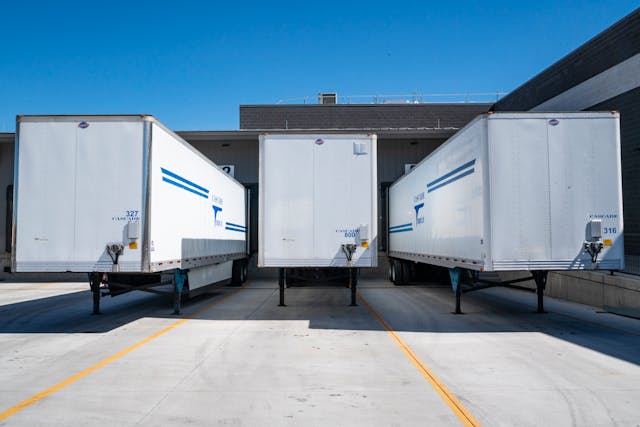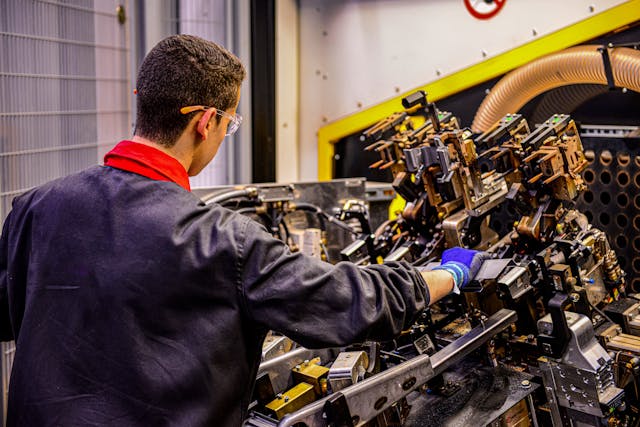As we move towards Industry 4.0, we need the complete capabilities of machine learning, computer vision, IoT, and other important technology implementations. Manufacturing firms will require a scalable and naturally integrated AI solution that can improve output, reduce risk, and strengthen production.
With the global AI in manufacturing market set to grow to $20.8 billion by 2028, global manufacturers are reviewing strategic integration, core analytics, use-cases, and implementation success. Manufacturing companies are aiming to leverage AI systems to make better sense of the production data being generated each day.
The major strategies for AI in manufacturing
AI powered production can improve output across several domains within the manufacturing industry. Firms can reach their digital potential and focus on driving major innovations using AI to implement into manufacturing.
Smart factories
The ultimate goal for global manufacturers is to reach a big data analytics focused model wherein data is helping improve output, lower risk, and enhance oversight into operations. By installing remote systems, computer vision, floor analytics, and AI equipment monitoring, firms can improve data intelligence.
The smart factories vision is also more achievable when there is an AI system implemented that leverages machine learning algorithms and deep learning neural networks. The large quantities of manufacturing data generated can help enterprises improve their operational oversight significantly.

Supply chain
From fleet analytics to inventory optimization, a range of operational processes can be improved with AI algorithms. Supply chain management can be a critical area that is enhanced by AI, as firms gain more access to all end points within the supply chain.
Manufacturers can also optimize their supply chain routes through AI-enabled data analytics. This can improve efficiencies across supply chain management, and enhance how manufacturers interact with warehousing, logistics, etc.

Digital twin
A digital twin is an essential tool for manufacturers to understand more about their products and units. Core information about performance, health, maintenance, and output, can be measured through AI based digital twin technologies.
Manufacturers can also scale production tracking through digital twins, when they're able to laser scan and manage a large number of twins for their entire inventory. This can significantly reduce production times, improve R&D efficiency, and enhance manufacturing output.
Quality control
Quality management is another critical area for AI and advanced manufacturing technologies. AI solutions can be used to check for faults, improve product quality, and perform analysis on faulty products at-scale.
Visual inspection AI can also catch quality issues that normal software technologies may not be able to analyse. You can also train data on your production lines to help improve capturing quality faults within a larger batch of products.

Green manufacturing
Energy efficiency is a major area of focus for AI applications within the manufacturing industry. Firms can lower their energy consumption and improve their energy utilization with AI enabled technologies. Managers can track consumption across their assets to identify high energy consumption areas.
Waste identification and disposal is another critical area for manufacturers as well. AI can help improve detection rates, disposal process management, and compliance to green manufacturing practices. Managers can also track the effectiveness of their waste management processes with AI.
Understanding the benefits of AI for manufacturing firms
To fully understand why manufacturing firms should implement AI applications into their ecosystem, decision makers need to explore the benefits of the technology.
AI in manufacturing is a complex integration, which is why focusing on the potential benefits for your enterprise can help in implementation.
Improved integration of processes
Through the scope of AI, managers can integrate all process within the centralized dashboard system that can be empowered with AI. Teams can be given access to process data, with automated task-sheets, programs, schedules, etc. based on worker bench and production line analysis.
Enhanced predictive maintenance
Managers can review machine health and detect potential breakdowns and needs for repair through data analytics. Deep learning and AI can help with understanding why certain machines require more maintenance, while others can run for longer hours.
Better demand analytics
Business owners can understand market trends better with machine learning. They can program set data for hundreds of thousands of inventory items and prepare AI models to detect demand trends for the future.
Enhanced inventory management
Inventory management is made that much more streamlined with artificial intelligence. The manufacturing industry can boost their ability to store assets in the right capacities, while also reducing latency between logistics and warehousing.
Improved forecasting
One of the most important benefits of implementing AI enabled software into manufacturing processes, is enhanced forecasting. By taking millions of data points generated within the manufacturing unit, enterprises can forecast production line throughput, inventory expansion, scale, and other important aspects.
Lower production risk
Through AI, managers can detect faults in production at scale. Business owners can check for production line issues across their units and locations within a centralized AI-driven software integration.
Improved worker safety
Workers can stay more secured through computer vision and AI, as managers can detect potential risk areas through direct analysis. Faults in machines, non-compliance to OSHA regulations, and other risk-focused areas can be checked via computer vision and AI.
Conclusion
Global manufacturers can improve their production efficiency, R&D, output, and risk management capabilities through AI. Artificial intelligence in manufacturing can be one of the most transformational technologies, allowing managers to gain deeper insights into their daily production processes.
The flexible integrations of AI with other technologies, such as computer vision, AR, VR, etc. can help manufacturers imagine new ways of connecting their processes. Managers can review production lines, improve worker safety, and enable better compliance through connected AI solutions.